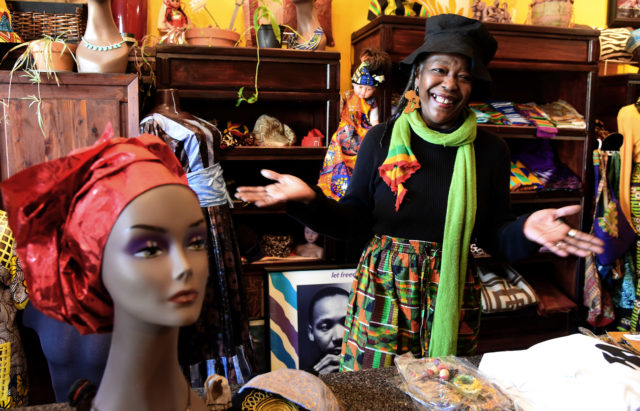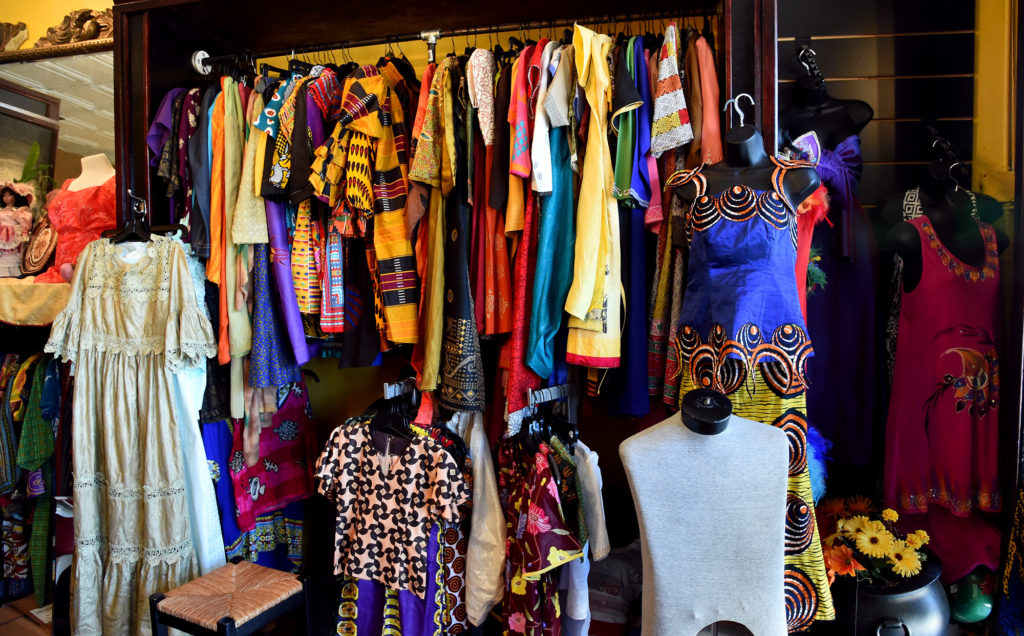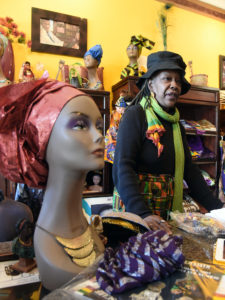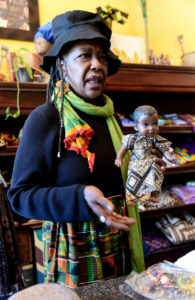
By Erica Wright
The Birmingham Times

Shirley Ferrill may be one of the new kids on the block in downtown Birmingham’s historic Fourth Avenue Business District, but she’s old school when it comes to helping in her community. Ferrill, 65, is the owner of Ferrill African Wear at 320 16th St. N., which opened in November 2017.
“The main goal, of course, is to sell African wear and profit from that,” she said. “But I also want to use it as a way to educate people about our culture, to provide opportunities for conversation about race and black history.”
Ferrill does more than just sell attire: “I do fashion shows. I’ve done them at schools, churches, workplaces, on the streets, all of which generate conversations about where the fashions come from and … customs surrounding some of the pieces,” she said.
For example, a gele is a headdress that is most common in West African countries, such as Nigeria, she pointed out.
“Most people who see the gele headdress immediately think Nigeria,” she said. “I have items from the Ivory Coast, Sierra Leone, Kenya, Ghana, or from wherever I can get them. I’m always reaching out to people that may be from African countries, whether they are students or people employed in different trades [in America].”
The Fourth Avenue Business District, which began to form at the turn of the 20th century, is a commercial area that stretches along 15th to 18th streets North, and from Rev. Abraham Woods Jr. Boulevard to Second Avenue North. It was known as the center for Birmingham’s black-owned businesses, which served black customers during the city’s long period of enforced segregation.
“Surrounded by Fabric”
Ferrill, a Sylacauga, Ala., native grew up the daughter of a seamstress during the Civil Rights Movement. Because of her mother’s work, Ferrill became interested in fashion.
“I grew up surrounded by fabric, color, and design, and I fell in love with it, but I hate sewing. I don’t sew. I just loved the brightness and fashion,” she said. “At 14, I was at a program at Talladega College called Upward Bound, and it was there that I had the first opportunity to meet Africans from the continent who also were students [in the program]. I was fascinated by them, [and] their clothing, in particular, caught my eye.”
Ferrill was interested in their authentic African clothing, which

was much different than what she was wearing in the late 1960s, and she asked her mother to begin making some of the attire.
“I pleaded with [one of the students] and got permission to take a dashiki for my mom to look at and see if she could make one,” Ferrill recalled. “She made six, and I sold two of them to [the student who gave me the original dashiki] when I got back to campus. So, I’ve basically been selling African wear since I was about 14, off and on.”
As she got older, worked, and raised a family, Ferrill—who has a son, a daughter, and three grandchildren—stopped selling African wear because sales were slow in Birmingham.
“I dropped it, but I always loved it,” she said. “I had an opportunity to do some traveling and see some African wear outside the area and thought, ‘Heavens, here we go again.’ So, I started buying pieces as I could. Usually, I had to travel in order to buy them because I couldn’t get them from anywhere near where I lived.”
Viable Market
After retiring from several different positions in various fields, including unemployment services for the state of Alabama, human resources, and customer service, Ferrill returned to selling African wear, setting up vendor booths at different events at churches and schools then opening a storefront in Ensley in 2014.
“It showed me that there is, in fact, a viable market in the Birmingham area for African wear and for a store that specifically sells African wear,” she said. “Ensley was good to me, but the building was old and in need of [major] repairs. You also had to climb like 20 stairs just to get into the building, and there was a 30-foot hallway. A lot of my customers are older, … so I continued in my prayer to locate in the historic district because I’ve always wanted to be in this area. I thought it was a great place and area of town to have such a business.”
Space opened in the Fourth Avenue Business District, and Ferrill jumped at the chance to get it. Since relocating she has seen an increase in business.
“The street traffic here has greatly improved over what it was in Ensley, … [and] it’s easy for my customers to find,” she said. “A lot of my customers do come from outside of the Birmingham metro area—from Gadsden, Anniston, or Tuscaloosa—and this is an area they can find easily. People feel comfortable here, and it’s just a beautiful spot.”
It also helps that the Fourth Avenue Business District is down the street from the Civil Rights District—all of which is downtown Birmingham, she said.
The Birmingham Civil Rights District is an area of downtown Birmingham where several significant events in the Civil Rights Movement took place in the 1950s and 1960s. Among the landmarks in the area are the Sixteenth Street Baptist Church, Kelly Ingram Park, the Carver Theatre, and the Birmingham Civil Rights Institute.
“Black Panther”

Ferrill saw a spike in business early last year around the premiere of the blockbuster film, Marvel’s “Black Panther.”
“I think identification with characters in the movie helped a lot,” she said. “Even though my sales have been good this year, they’re nothing like they were this time last year. … You couldn’t have gotten in here. … There were days when the line was all the way out the door, and I was here as late as 8:30 or 9 at night.”
Ferrill said she sees a resurgence of young people wearing African clothing, even outside of Black History Month.
“This store also gives me the opportunity to talk to young people,” she said. “I deliberately [find ways] to get more young people involved. … I use young models as early as age 2 [in my shows]. I also deliberately reach out to those in the young-adult age range because a lot of them are interested in modeling, so that’s one way to get them to wear African clothing.
“Once a month, I invite young girls to come in and help me re-dress the dolls. … While we’re doing that, we’re talking. We’re talking about being bullied, what it means to be black, what it means to be black and beautiful, what it means to be at school and learning about your ancestors having been slaves and how that makes you feel. … We talk about it all.”
As a child of the 1950s and the Civil Rights Movement of the 1960s, Ferrill said she is honored to be a business owner in the historic district.
“I was 10 the year the Sixteenth Street Baptist Church was bombed, and those girls were killed. I was so traumatized that for three months I couldn’t even go into a church,” she said. “To now be down the street [from the church], sometimes I walk down there just to reflect on the changes in my life and in my world since that took place.
“[The Birmingham Civil Rights Movement] had some profound changes on the world. I say to people, … ‘We’ve come a long way, but we’ve got a long way to go.’ … Being in this area really keeps that at a forefront of my mind. … This area used to be truly just black businesses, and they were lucrative black businesses that served a wide variety of people from the upper echelon to the lower [rungs of] society. [No matter who you were], there was something on Fourth Avenue for you. I love being here.”
Ferrill African Wear is open from 11 a.m. to 5 p.m., Tuesdays through Saturdays. For more information, call 205-529-1182 or visit Ferrill African Wear on Facebook.



